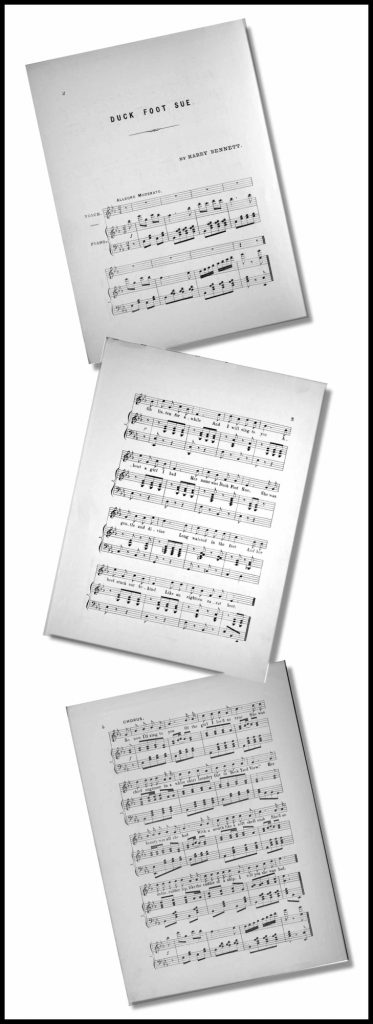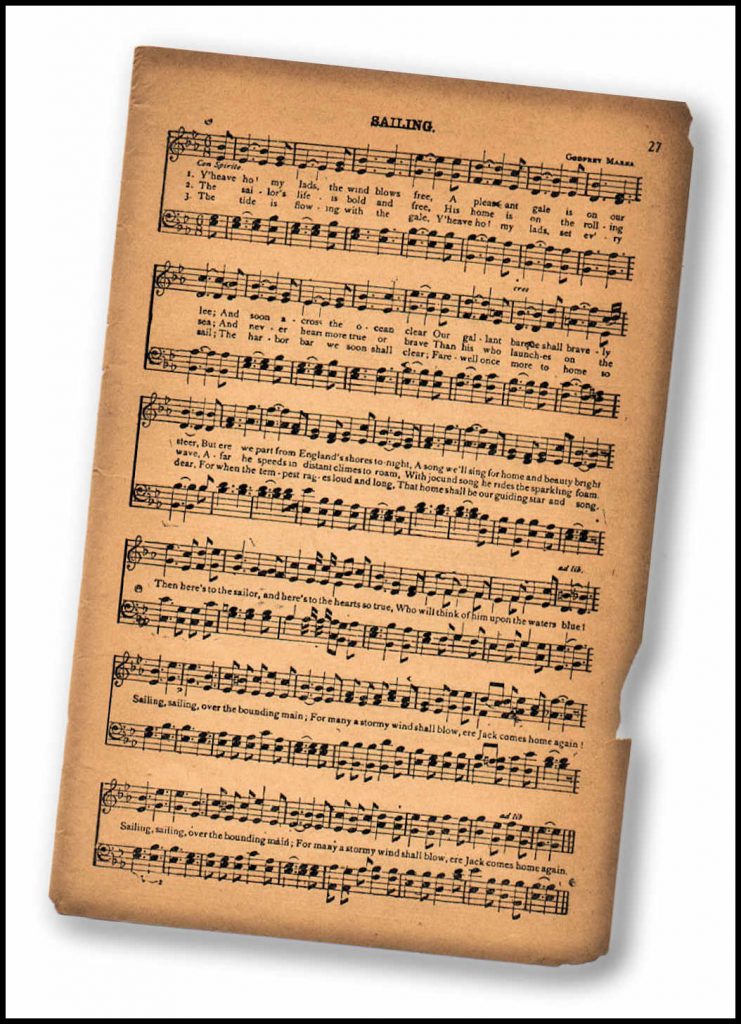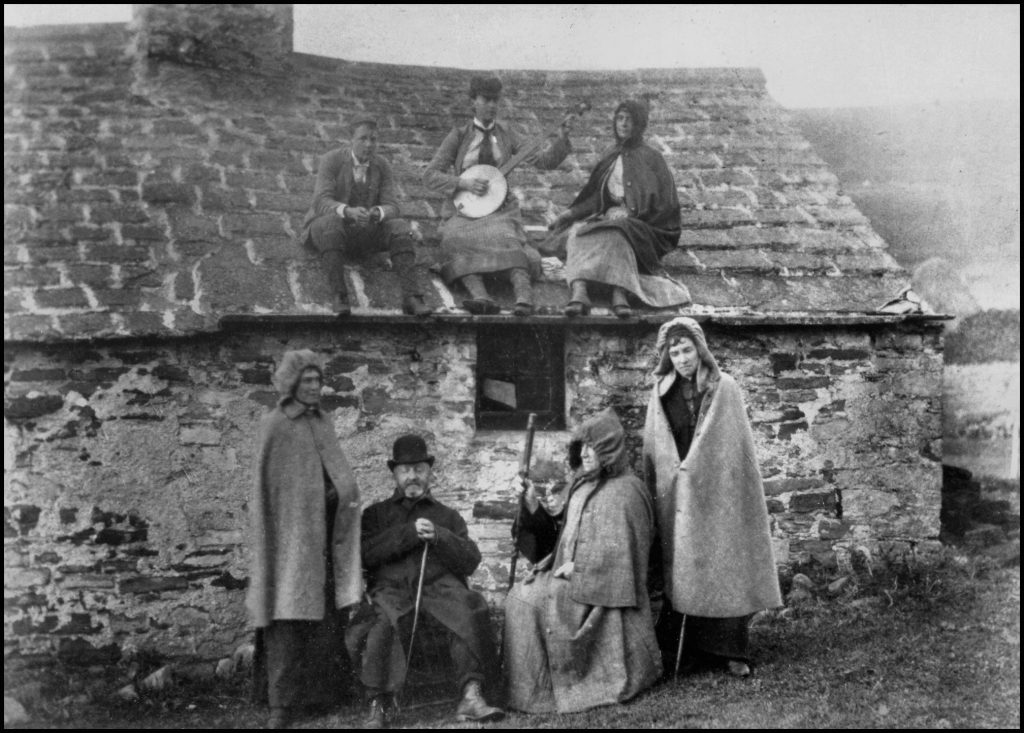I found the photo below in Tommy Gibson’s collection, noting how odd it was to see a lady sitting on a roof playing the banjo! Written on the back was the following: General Burroughs with his guests at Lows House, Westness, Rousay. A few days later I spent a while in the Library & Archive in Kirkwall, and whilst turning the pages of Burroughs’ collection of newspaper cuttings I came across one from The Orcadian, dated November 16th 1889, which gave details of a ‘Free Concert’ at the Frotoft School. Lo and behold – it contained the name of the banjo player……
ROUSAY FREE CONCERT. – On the evening of Friday, 8th November, a free concert was given by the ladies of Westness House in the Frotoft Public School. Rev A. Pirie occupied the chair, and General and Mrs Burroughs were present on the platform. The inhabitants of Rousay should feel deeply indebted to the ladies of Westness for providing them with such a treat as was afforded on Friday evening. The services of Misses McDonald and Ewbank toward the success of the concert cannot be over-rated; and the accompaniments played by Mrs McDonald left nothing to be desired. The songs sung by Mr Hugh Inkster did not fail to tickle the comic faculties of every individual in the audience. Several solos were exquisitely rendered by Miss McDonald on the banjo. Master D. Learmonth’s rendering of “Duck Foot Sue” was excellent, and loudly applauded. Mr Marwick’s contributions to the programme do him great credit. The recitations were well rendered. The plantation songs reflect great praise both on the conductor and the chorus. The school children performed their part well under the able superintendence of Mr Muir.
Programme. – Plantation song, ‘Clitter Clatter’, chorus; song, ‘Powder Monkey Jim’, Mr Hugh Inkster; recitation, ‘Boys’ Rights’, Mr John Craigie; song, ‘Just as well’, Miss Ewbank, Violin; ‘Scotch Airs’, Mr N. Mainland; song, ‘Ballyhooly’, Mr Marwick; duet, ‘Down where the Blue Bells grow’, Mr Craigie and Mr D. Learmonth; song, ‘The Fishers’, Mrs Pirie; recitation, ‘Hodge and the Vicar’, Mr Muir; song, ‘Sailing’, Mr W. Learmonth; plantation song, ‘Dinah’s Wedding’, chorus; violin and song, ‘Serenade’, Miss Ewbank and Miss McDonald; song, ‘Razors in the Air’, Mr Hugh Inkster; banjo solo, ‘Darling Clementine’, Miss McDonald; duet, ‘A.B.C.’, Miss Low and Mr Mainland; song, ‘The Three Dreamers’, Mr W. Learmonth; song, ‘Duckfoot Sue’, Mr D. Learmonth; chorus, ‘Silverlake’, school children; melodeon, ‘Scotch Airs’, Mr R. Flett; song, ‘No Sir’, Miss S. Ewbank; piano, ‘Dance Music’, Miss Pirie; recitation, ‘ Modern Music’, Mr James Craigie; banjo solo, ‘Peptia’, Miss McDonald; plantation song, ‘Goodnight’, chorus.
General Burroughs in a neat speech proposed a hearty vote of thanks to the ladies from Westness House for getting up the concert, and also to the performers who had taken part. A vote of thanks was given to the Rev A. Pirie for his conduct in the chair. After singing ‘God Save the Queen,’ a very enjoyable evening was brought to a close.
[Orkney Archive reference: D19/6 p139]
The lyrics of two of the songs mentioned above are not without interest:

DUCK-FOOT SUE
written by Harry Bennet in 1884
Just keep your seats awhile
And I will tell to you,
Of the love I used to feel for
A gal named Duck-foot Sue;
She was gentle and divine,
Long-waisted in the feet;
Her heel stuck out behind,
Like an eighteen karat beet.
Chorus.
So now I’ll tell to you of the
Gal I loved so true;
She was second-hand mate in a
Chinese laundry out in Kalamazoo.
Her beauty was all that she had,
She was built like a North River shad;
She’d an India-rubber lip, like the rudder of a ship,
With a razor she was bad.
She wasn’t very fat.
Or either very thin;
She looked, when she was dressed,
Like a straw in a barrel of gin.
I took her to the ball
Of the Hardly Able Club,
It cost a ten-case note
For to fill her up with grub.
Chorus.
She’d an eye like a hard-shell clam,
And a voice like a catamaran;
She could chin for an hour at a forty-horse power,
And an ear like a Japanese tan.
Her hair was an indigo blue,
She was as graceful as a kangaroo;
You ought to hear her rustle with her patent leather bustle.
She could whistle like a steamboat, too.
But since she ran away,
I’ve almost lost my breath;
If she travels on her shape,
She’s sure to starve to death.
If I had married her,
I’d almost been afraid
Of being shot or scalped
By the mother-in-law brigade.
Chorus.
For she was a funny old guy,
With a double-barrelled squint in her eye;
Her number ten feet used to cover up the street,
She’d a mouth like a crack in a pie.
She’d a cheerful cemetery laugh,
And a head like a Mexican calf;
When she’d cry, you’d think she’d died,
This gal who was so fond of her half-and half.

SAILING
written in 1880 by Godfrey Marks, a pseudonym of British organist and composer James Frederick Swift (1847–1931)
Y’heave ho! my lads, the wind blows free,
A pleasant gale is on our lee;
And soon across the ocean clear,
Our gallant barque shall bravely steer.
But ere we part from England’s shores to-night,
A song we’ll sing for home and beauty bright.
CHORUS.
Then here’s to the sailor, and here’s to the hearts so true,
Who will think of him upon the waters blue!
Sailing, sailing, over the bounding main;
For many a stormy wind shall blow, ere Jack comes home again!
Sailing, sailing, over the bounding main;
For many a stormy wind shall blow, ere Jack comes home again!
The sailor’s life is bold and free,
His home is on the rolling sea;
And never heart more true or brave
Than his who launches on the wave,
Afar he speeds in distant climes to roam,
With jocund song he rides the sparkling foam.
The tide is flowing with the gale,
Y’Heave ho! my lads, set ev’ry sail;
The harbor bar we soon shall clear;
Farewell once more to home so dear,
For when the tempest rages loud and long,
That home shall be our guiding star and song.
